
Ready to get certified?
Free CDCES Coach App

Subscribe
eNewsletter
Download
Free Med Pocket Cards
Rediscovering Walking – From Rucking to Kicking Up Intensity
Walking is often recognized as the most accessible and underrated form of exercise. While some may argue in favor of high-intensity cardio or resistance training, a growing body of evidence suggests that walking offers significant benefits—especially when approached with intention and consistency.
According to Dr. Elroy Aguiar, an assistant professor of exercise science at The University of Alabama, walking remains one of the most beneficial forms of movement due to its low barriers to entry—minimal cost, equipment, or skill required. “That’s why we say it’s the best,” Dr. Aguiar notes. And yet, despite this accessibility, many individuals struggle to find time to incorporate walking into their busy, sedentary lives.

🚶♂️ Cadence Matters: Walking with Intensity
Not all walking provides the same health return. The intensity, particularly cadence (steps per minute), plays a crucial role in determining health outcomes.
🕒 100 steps per minute is considered moderate intensity
⚡ 130 steps per minute qualifies as vigorous intensity
Dr. Aguiar’s research, published in the British Journal of Sports Medicine, indicates that health benefits from walking begin to accumulate at moderate or higher intensities. Most people naturally walk at a pace of 110–115 steps per minute when moving briskly. Increasing cadence just slightly can shift the effort from moderate to vigorous, maximizing the health payoff in a shorter time span.
🎒 Add Intensity with Rucking
For those looking to increase the challenge of walking, rucking—walking with a weighted backpack—offers a practical solution.
Adding resistance increases oxygen demand, raises heart rate, and enhances caloric burn without requiring a change in pace or duration. According to Dr. Aguiar, this method can also improve lower body strength and bone density, particularly with consistent practice over time.
While it won’t replace traditional strength training, rucking offers an accessible way to gain some muscular benefits while walking. A light weight to start, gradually increased, can help prevent injury and support adaptation.
⏱️ One Minute Can Make a Difference
A 2024 study published in the Scandinavian Journal of Medicine and Science in Sports found that both the quantity and intensity of physical activity are associated with better health outcomes. Remarkably, even one minute of higher-intensity activity per day was linked to a lower likelihood of having metabolic syndrome—a cluster of risk factors including visceral adiposity, high blood pressure, high blood sugar, low HDL cholesterol, and elevated triglycerides.
Dr. Aguiar explains that an individual’s most intense one-minute activity across the day can serve as a strong indicator of metabolic health. Even brief, high-intensity bursts of activity may help reduce risk for diabetes, hypertension, and cardiovascular disease.
🍽️ Walking After Meals: A Simple Strategy for Blood Glucose Improvement
Another practical strategy supported by research is post-meal walking. A 15-minute walk after meals can help blunt spikes in blood glucose, particularly in older adults at risk for glucose intolerance.
When muscles are active, they draw glucose from the bloodstream to use for energy, thereby reducing blood sugar levels and easing the demand on insulin. Over time, this can help prevent insulin resistance, a precursor to Type 2 diabetes.
Dr. Aguiar notes that consistent post-meal movement can reduce the workload on the pancreas and enhance the muscles’ ability to absorb and use glucose. This daily practice may offer long-term protection against metabolic syndrome, hypertension, and diabetes.
📉 Step Count and Longevity
Large-scale studies have shown clear associations between step count and mortality risk. A 2023 meta-analysis published in the European Journal of Preventive Cardiology found:
- 2,337 steps/day: lower cardiovascular mortality
- 3,867 steps/day: lower all-cause mortality
- Each additional 1,000 steps: 15% reduction in all-cause mortality
- Each additional 500 steps: 7% reduction in cardiovascular mortality
Additionally, a study by the University of Granada concluded that while more steps bring more benefits, the majority of cardiovascular protection appears to occur around 7,000 steps/day. The popular goal of 10,000 steps per day, while not evidence-based, remains a useful motivational benchmark.
💡 Who Benefits the Most?
For elite athletes, walking may offer limited fitness returns. However, for individuals who are sedentary or new to exercise, walking provides a low-impact, effective entry point to better health.
Some key benefits of walking for the general population include:
- Improved cardiovascular health
- Strengthened muscles and joints
- Support for bone density
- Increased daily caloric expenditure
- Reduced risk of chronic diseases
Walking is especially valuable for individuals managing or at risk for Type 2 diabetes, obesity, hypertension, and metabolic syndrome.
🔟 Key Takeaways
- Cadence matters – 100 steps per minute = moderate; 130+ = vigorous
- Even one minute of high-intensity movement can improve metabolic markers
- 15-minute walks after meals can significantly lower blood glucose
- Rucking adds intensity, strength, and calorie burn to walking
- Walking is linked to lower mortality from all causes and cardiovascular disease
- Most benefits occur by 7,000 steps/day, but more is better
- Walking is an entry point to fitness, particularly for the sedentary
- The practice supports muscle and bone health
- It requires no equipment and is nearly universally accessible
Walking delivers significant, sustainable health benefits with minimal risk
📝 Final Thoughts
Walking is a powerful yet underappreciated form of movement. Whether used to regulate blood sugar, reduce cardiovascular risk, or improve mental clarity, walking remains one of the most effective and inclusive health strategies available.
For anyone looking to improve overall health without the barriers of cost, complexity, or time—walking offers a proven path forward.
📚 References
- Aguiar, E. J., et al. (2021). Walking cadence (steps/min) and intensity in 21–40-year-olds: CADENCE-adults. British Journal of Sports Medicine.
- DiPietro, L., et al. (2013). Benefits of Postmeal Walking on Glycemic Control in Older Adults at Risk for Impaired Glucose Tolerance. Diabetes Care, 36(10), 3262–3268.
- European Journal of Preventive Cardiology (2023). Daily step count and all-cause and cardiovascular mortality: a dose–response meta-analysis.
- University of Granada Study (2023). Step count thresholds for cardiovascular benefit: optimal versus traditional targets. European Journal of Preventive Cardiology.
Recorded & Ready for OnDemand Viewing!
Tech Data Toolkit!

Gain confidence in interpreting Glucose Profile Report (AGP) & CGM data using a person-centered approach! Earn 4.0 CEs
If you are preparing for certification exams or want to up your game using CGM data to improve outcomes, this course is for you.
1:30am to 2:30pm PST
Gain confidence in interpreting Glucose Profile Report (AGP) & CGM data using a person-centered approach.
As diabetes technology is becoming commonplace in our practice, figuring out how to make sense of all the data can seem overwhelming. Join Diana Issacs and Coach Beverly for a truly unique learning experience.
Dr. Isaacs has a special knack for breaking down the essential elements of the Ambulatory Glucose Profile (AGP) report to provide participants with a clear road map for data interpretation. She includes many sample practice cases utilizing CGM data for various types of people with diabetes including type 2 and people with type 1 not on pumps.
Coach Beverly will build on Dr. Isaacs’ presentation and switch the focus to the person living with diabetes. Using a case study approach, she will provide strategies to integrate the AGP with person-centered care that empowers individuals to experience increased confidence in their diabetes self-management.
By attending this interactive workshop, participants will become more confident in interpreting the AGP and continuous glucose monitor (CGM) data and determining needed medication and lifestyle adjustments with a person-centered approach.
Topics include:
Review CGM key metrics and individualize time in-range goals
Learn how to recognize patterns with the AGP report efficiently
Utilize the AGP report as a discussion guide when meeting with a person with diabetes
Recommend lifestyle and medication adjustments based on CGM data
Strategies to recognize the expertise of the individual and collaborate on person-centered problem solving.
Rationale of the Week | Decoding AGP Report – Test Your Knowledge!
For last week’s practice question, we quizzed participants on Decoding AGP Report-Test Your Knowledge. 49% of respondents chose the best answer. We want to clarify and share this important information, so you can pass it on to people living with diabetes and your colleagues, plus prepare for exam success!
Before we start though, if you don’t want any spoilers and haven’t tried the question yet, you can answer it below: Answer Question

Question: AJ asks you why their blood glucose levels are “all over the place”. When you look at the AGP, you notice the coefficient of variation is 26%. What is the best response?
Answer Choices:
- Even though your coefficient of variation is above target, we can work to bring that down.
- It seems like you are making a big effort keep your glucose in target range.
- Given your glucose fluctuations, we may need to intensify your medication regimen.
- With some small changes in lifestyle activities, I am sure you can make improvements.
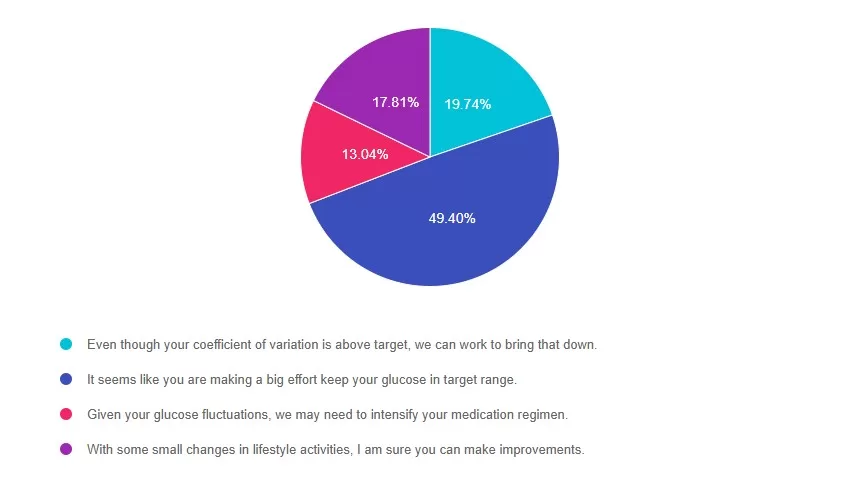
Getting to the Best Answer
Answer 1 is incorrect. 19% chose this answer, “Even though your coefficient of variation is above target, we can work to bring that down.” According to ADA Standards, the goal for glucose variability (or coefficient of variation) is less than 36%. AJ has a coefficient of variation of 26%, which is significantly below the target. This is a wonderful opportunity to recognize AJ’s self-management efforts.
Answer 2 is correct. 49% of you chose this answer, “It seems like you are making a big effort keep your glucose in target range.” YES, this is the BEST Answer. AJ has a coefficient of variation of 26%. That is 10% below the target of 36%. This is a wonderful opportunity to recognize AJ’s self-management efforts.
Answer 3 is incorrect. About 13% of respondents chose this, “Given your glucose fluctuations, we may need to intensify your medication regimen.” According to ADA Standards, the goal for glucose variability (or coefficient of variation) is less than 36%. AJ has a coefficient of variation of 26%, which is significantly below the target. This is a wonderful opportunity to recognize AJ’s self-management efforts.
Finally, Answer 4 is incorrect. 17% chose this answer, “With some small changes in lifestyle activities, I am sure you can make improvements.” According to ADA Standards, the goal for glucose variability (or coefficient of variation) is less than 36%. AJ has a coefficient of variation of 26%, which is significantly below the target. This is a wonderful opportunity to recognize AJ’s self-management efforts.
We hope you appreciate this week’s rationale! Thank you so much for taking the time to answer our Question of the Week and participate in this fun learning activity!
There’s Still Time! 🕒
Join us today for Part 2 of Tech Data Toolkit!
*Don’t worry if you missed the first session. All of our webinars are recorded and ready for OnDemand Viewing!

Dr. Diana Isaacs speaks live today @ 11:30am PST today!
Dr. Isaacs has a special knack for breaking down the essential elements of the Ambulatory Glucose Profile (AGP) report to provide participants with a clear road map for data interpretation. She includes many sample practice cases utilizing CGM data for various types of people with diabetes including type 2 and people with type 1 not on pumps.
Topics include:
- Review CGM key metrics and individualize time in-range goals
- Learn how to recognize patterns with the AGP report efficiently
- Utilize the AGP report as a discussion guide when meeting with a person with diabetes
- Fresh approach to lifestyle and medication adjustments based on CGM data.
All hours earned count toward your CDCES Accreditation Information
Sign up for Diabetes Blog Bytes – we post weekly Blog Bytes that are informative and FREE! Every week we post one exam practice Question of the Week and Rationale of the Week. Sign up below!
Recent Blog Bytes
- Rationale of the Week | Which Feature Most Strongly Supports a Diagnosis of HHS Rather Than DKA?
- How Not Winning Motivated Me to Write A Book
- Question of the Week | What Not to Say to Overwhelmed Individual
- February 2026 eNews
- Rationale of the Week | Best Response for Facilitating Positive Health Behavior Change?
The use of DES products does not guarantee the successful passage of the certification exam. CBDCE and ADCES do not endorse any preparatory or review materials for the CDCES or BC-ADM exams, except for those published by CBDCE & ADCES.
Vitamin D and Insulin Sensitivity

Could a Vitamin Hold the Key to Improving Insulin Sensitivity?
Beyond its well-known role in bone health, vitamin D has gained attention for its potential impact on glucose metabolism and insulin resistance. Vitamin D is a fat-soluble vitamin, but it acts more like a hormone, helping regulate calcium and phosphorus balance, modulating immune function, cell differentiation and inflammation, and influencing whole-body insulin sensitivity.
An inverse relationship has been observed between vitamin D status and markers of inflammation, insulin resistance, and glucose intolerance. An estimated 41% of the U.S. population has vitamin D insufficiency, with even higher prevalence during winter months and among women, non-Hispanic Black Americans, and older adults.1 Low vitamin D levels have been associated with an increased risk of developing type 2 diabetes2 and macrovascular and microvascular complications in individuals with type 2 diabetes. These risks spark interest in whether vitamin D supplementation could play a role in preventing and managing diabetes.
Mechanisms Linking Vitamin D and Insulin Resistance
Vitamin D receptors (VDRs) are located in pancreatic β-cells, adipose tissue, and skeletal muscle, which are all key sites in glucose metabolism. Adequate vitamin D levels support insulin secretion, enhance tissue sensitivity to insulin, reduce the expression of proinflammatory cytokines, and regulate metabolic pathways that influence insulin resistance. These physiological mechanisms explain how vitamin D status might influence the development and progression of type 2 diabetes.
Conflicting Evidence from Clinical Research
Recent studies have sought to clarify whether vitamin D supplementation can improve insulin sensitivity. A 2023 meta-analysis published in Scientific Reports analyzed 18 randomized controlled trials and 20 observational studies involving over 12,000 participants.3 It found that vitamin D supplementation was associated with significant reductions in fasting insulin, glucose levels, and HOMA-IR scores, suggesting improved insulin sensitivity. Their reviewed observational studies, however, suggested that improvements were not independent of other variables.
Overall, their findings concluded individuals with low levels may benefit from supplementation.
However, a 2020 meta-analysis of 18 randomized control trials, published in Diabetes Care,4 found no significant improvements in insulin sensitivity using gold-standard measures such as the hyperinsulinemic-euglycemic clamp, the Matsuda index, or intravenous glucose tolerance tests.
They concluded there was no evidence that Vitamin D supplementation benefited individuals with or at risk of insulin resistance.
Differences in study populations, vitamin D dosing amounts, baseline vitamin D status, and outcome measures likely account for outcome differences between the two meta-analysis reports.
Vita D Clinical Guidelines: Conflicting Recommendations
Clinical recommendations vary regarding vitamin D supplementation for diabetes prevention. The 2024 Endocrine Society Clinical Practice Guidelines (endorsed by AACE) provide updated supplementation guidance.5 But the American Diabetes Association took a different stance.
2024 Endocrine Society Clinical Practice Guidelines
For healthy adults the guidelines recommend adhering to the Institute of Medicine’s RDAs: 600 IU (15 μg) daily for ages 18-50 and 800 IU for ages 50-74. The guidelines also identify groups such as older adults (over 75), youth (under 18), pregnant individuals, and people with prediabetes who may benefit from higher intakes and supplementation. They suggested empiric Vitamin D supplementation in individuals with prediabetes to reduce the risk of progression to diabetes, but they did not name a specific recommended dose. They noted that optimal Vitamin D intake and serum 25 (OH)D concentration for disease prevention were uncertain and did not suggest routine screening.5 The guideline referenced the reviewed clinical trial dosing of 842 – 7543 IU daily. However, these recommendations are cautious and emphasize daily over high-dose intermittent supplementation. Supplementation guidelines for individuals with diabetes were not reviewed.
In contrast, the American Diabetes Association (ADA) Standards do not recommend vitamin D supplementation solely for the prevention of type 2 diabetes.6 While some studies suggest a potential link between vitamin D deficiency and an increased risk of developing diabetes, ADA states that more research is needed to confirm a causal relationship and to determine whether vitamin D supplementation can effectively delay or prevent the onset of diabetes.
Implications for Practice
For diabetes educators, these findings highlight the importance of individualized care and the need for thoughtful evaluation of vitamin D status in people with or at risk for diabetes. While vitamin D supplementation may not be universally recommended for improving insulin sensitivity or preventing diabetes, supplementation can be considered in high-risk groups to support potential health benefits. Until we have conclusive recommendations, educators can remain up to date with emerging research and tailor care strategies to an individual’s health status, risk, lifestyle, and curiosity about Vitamin D supplementation.
References:
- 1. Cui A, Xiao P, Ma Y, Fan Z, Zhou F, Zheng J, Zhang L. Prevalence, trend, and predictor analyses of vitamin D deficiency in the US population, 2001-2018. Front Nutr. 2022 Oct 3;9:965376
- Adriyan Pramono, Johan W.E. Jocken, Ellen E. Blaak, Marleen A. van Baak; The Effect of Vitamin D Supplementation on Insulin Sensitivity: A Systematic Review and Meta-analysis. Diabetes Care1 July 2020; 43 (7): 1659–1669.
- Lei X, Zhou Q, Wang Y, et al. Serum and supplemental vitamin D levels and insulin resistance in T2DM populations: a meta-analysis and systematic review. Sci Rep. 2023;13(1):12343
- Pramono A, Jocken JWE, Blaak EE, van Baak MA. The Effect of Vitamin D Supplementation on Insulin Sensitivity: A Systematic Review and Meta-analysis. Diabetes Care. 2020 Jul;43(7):1659-1669.
- Marie B Demay, Anastassios G Pittas, Daniel D Bikle, Dima L Diab, Mairead E Kiely, Marise Lazaretti-Castro, Paul Lips, Deborah M Mitchell, M Hassan Murad, Shelley Powers, Sudhaker D Rao, Robert Scragg, John A Tayek, Amy M Valent, Judith M E Walsh, Christopher R McCartney, Vitamin D for the Prevention of Disease: An Endocrine Society Clinical Practice Guideline, The Journal of Clinical Endocrinology & Metabolism, Volume 109, Issue 8, August 2024, Pages 1907–1947
- Vitamins, Minerals and Supplements downloaded on April 19th 2025 from https://diabetes.org/food-nutrition/diabetes-vitamins-supplements.
Join us for this upcoming Level 5 Course
Level 5 | Weight-Inclusive Diabetes Care: Turning Compassion into Practical Tools
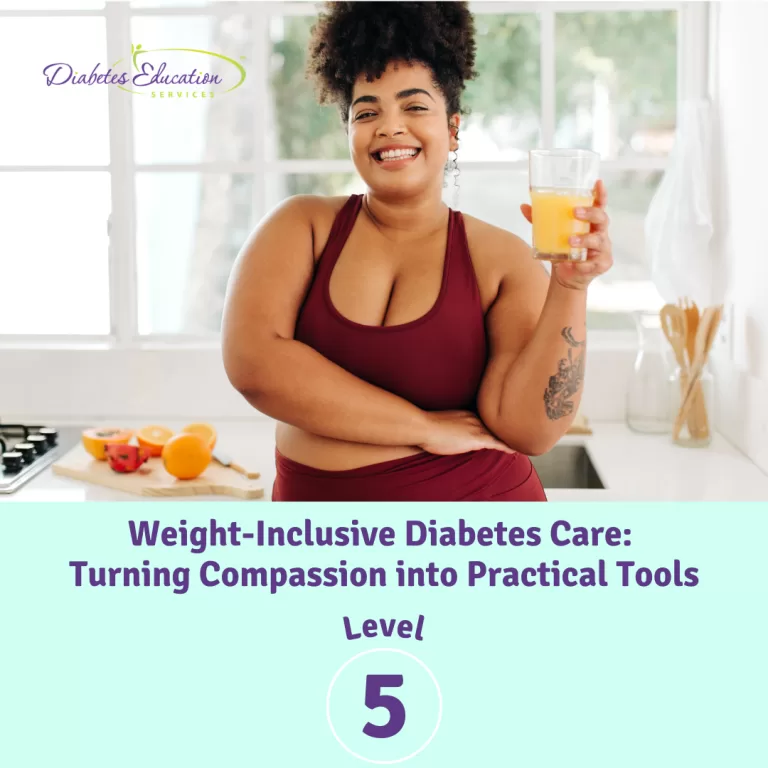
This session provides healthcare providers with actionable strategies to integrate weight-inclusive care into diabetes management practices, focusing on improving outcomes through respect for body diversity and individual autonomy. Weight stigma is a well-documented barrier to effective care, contributing to poorer glycemic control, disordered eating, and care avoidance. By shifting from a weight-focused approach to one aligned with Health at Every Size (HAES®), providers can foster trust, enhance participant engagement, and support sustainable health behaviors.
Jessica Jones, MS, RD, CDCES, will share evidence-based insights on mitigating weight stigma and applying HAES-aligned strategies in practice. Participants will learn how to build rapport, set realistic nutrition goals, and implement interventions that prioritize blood sugar management, joyful movement, and intuitive eating. This session equips providers with tools to deliver compassionate, person-centered care, improving both clinical outcomes and the provider-participant relationship.
Question of the Week | How much do you know about Coach Bev?

Each month, we’ll test your knowledge with fun questions about Coach Beverly! She’s been a leader in diabetes education for over 25 years—but how did her journey begin, and what shaped her philosophy?
Quiz Time!
Which early job taught Coach Beverly the value of loving your work and providing excellent service?
- Working as a monitor technician at a community hospital.
- Volunteering at a convalescent hospital after school.
- Showing up at Ying’s Kitchen Chinese Food Restaurant.
- Babysitting a family of six kids during the summer.
Level 2 | Older Adults & Diabetes Upcoming Webinar
Join us tomorrow May 13th @ 11:30am PST for Older Adults & Diabetes Webinar!!💻
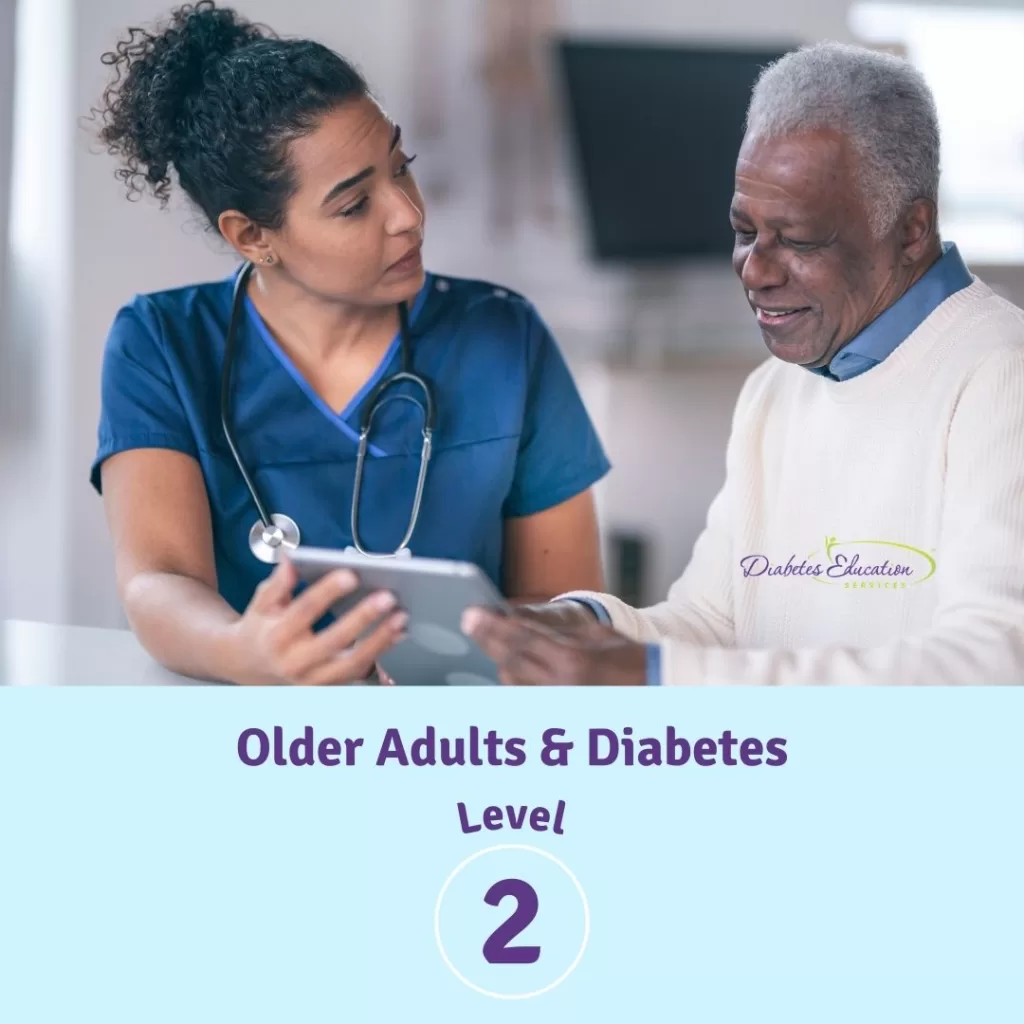
We are living longer & more people are getting diabetes. The American Diabetes Association has updated the Older Adults Standards, with special attention to considering the reduction of medication & insulin therapy intensity. The older population has unique issues & special needs that require consideration as we provide diabetes self-management education. This online course highlights key areas of assessment, intervention, and advocacy for older clients living with diabetes.
Objectives:
- Self-management considerations for older individuals.
- Strategies to prevent complications & maintain optimal quality of life.
- The role of the Diabetes Care & Education Specialist as an advocate.
Learning Outcome:
The diabetes care team will have an increased knowledge of special considerations, individualized goals, and standards for older individuals with diabetes to include in their practice.
Why Attend These Webinars?
- Accessible learning: All webinars are available online, so you can attend from the comfort of your home or office.
- Expert-led: Presentations are led by experienced diabetes educators, healthcare professionals, and researchers.
- Practical advice: Each session is designed to give you actionable strategies that can be applied in your daily life or practice.
- Up-to-date information: Stay informed about the latest research, guidelines, and technology in diabetes care.
How to Register?
Register above or simply visit our Online Store at DiabetesEd.net. This session offers Continuing Education (CE) credits.
For more information or any questions, please email [email protected].
All hours earned count toward your CDCES Accreditation Information
Tech Data Toolkit Session 2 airs this week, but it’s not too late to register!

- Session 1 – May 8th with Beverly Thomassian at 11:30 am – 12:30 PST
- Session 2 – May 15th with Dr. Diana Isaacs at 11:30 am – 2:30 PST
*If you missed the first session please note recordings are available for OnDemand viewing.
Topics include:
- Review CGM key metrics and individualize time in-range goals
- Learn how to recognize patterns with the AGP report efficiently
- Utilize the AGP report as a discussion guide when meeting with a person with diabetes
- Recommend lifestyle and medication adjustments based on CGM data
- Strategies to recognize the expertise of the individual and collaborate on person-centered problem solving.
Learning Outcome:
Participants will be able to interpret the AGP and continuous glucose monitor (CGM) data and determine needed medication and lifestyle adjustments with a person-centered approach.
All hours earned count toward your CDCES Accreditation Information
Sign up for Diabetes Blog Bytes – we post weekly Blog Bytes that are informative and FREE! Every week we post one exam practice Question of the Week and Rationale of the Week. Sign up below!
Recent Blog Bytes
- Rationale of the Week | Which Feature Most Strongly Supports a Diagnosis of HHS Rather Than DKA?
- How Not Winning Motivated Me to Write A Book
- Question of the Week | What Not to Say to Overwhelmed Individual
- February 2026 eNews
- Rationale of the Week | Best Response for Facilitating Positive Health Behavior Change?
The use of DES products does not guarantee the successful passage of the certification exam. CBDCE and ADCES do not endorse any preparatory or review materials for the CDCES or BC-ADM exams, except for those published by CBDCE & ADCES.
May 2025 eNews Letter
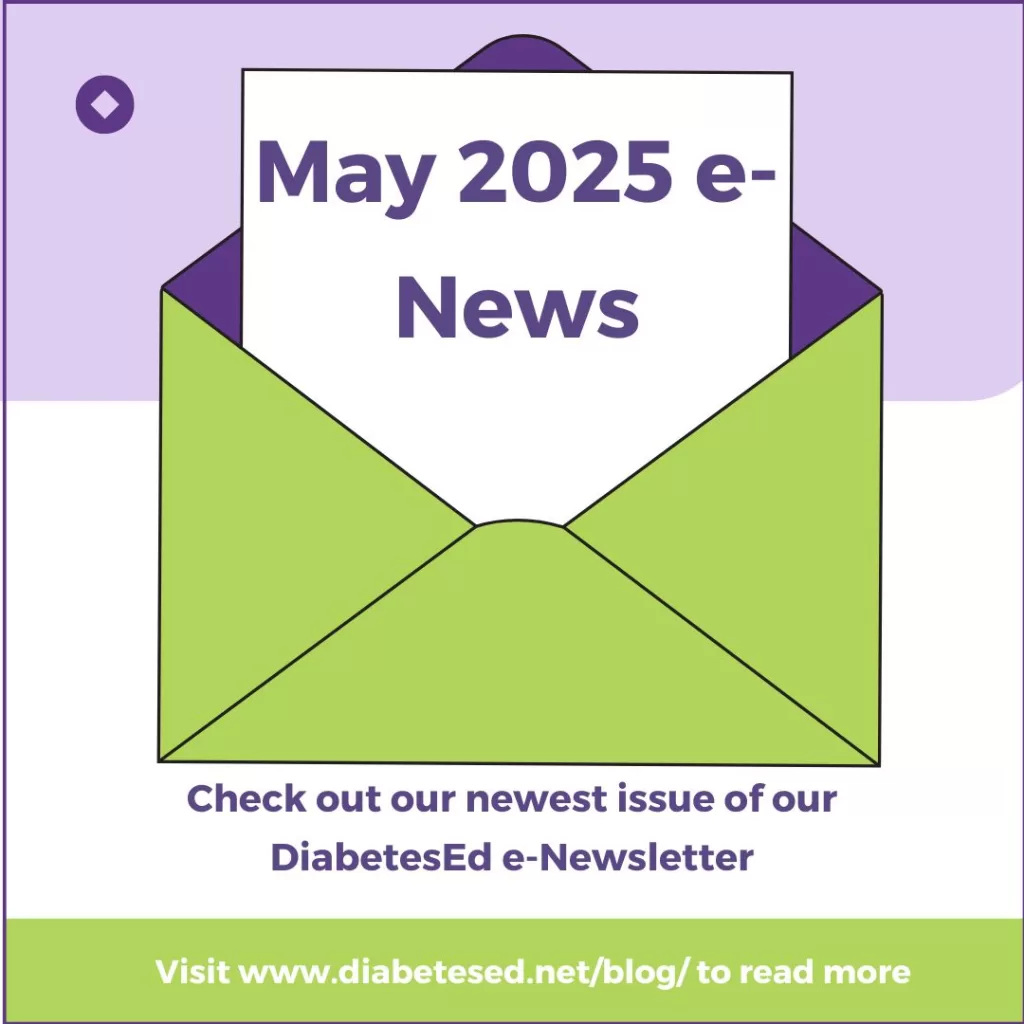
Announcements
_________________________
- Vitamin D & Insulin Sensitivity
- Rediscovering Walking – From Rucking to Kicking Up Intensity
- Type 5 Diabetes Recognized
- Healing Shift: How a Chinese Restaurant Became My Refuge – Coach Bev
- Question of Week | Decoding AGP Report
- Rationale of the Week | What Stage of Change?
- 20% OFF Spring Sale Starts May 6th – Code Bloom20
Upcoming Programs
___________________________
Happy May!💚
We’re celebrating Tiffany’s birthday with a 20% Off Sale—plus a special newsletter featuring important diabetes updates you won’t want to miss!
I am sure you have read hopeful yet conflicting information on the promise of Vitamin D in reducing inulin resistance and the risk of type 2 diabetes. Nutrition expert Christine Craig helps us sort fiction from fact so we can pass along accurate recommendations to our clients and colleagues.
You know walking is excellent for improving health, but what about taking it up a notch with rucking or kicking the intensity? Walking is one of the most accessible activities, and it gives everyone an excuse to enjoy nature and those moments of awe.
Type 5 diabetes is now officially recognized by the International Diabetes Federation as a new form of diabetes. Increased awareness of type 5 diabetes may help prevent misdiagnosis due to features similar to type 1 diabetes. Learn more about this condition that primarily affects undernourished teenagers and young adults.
Coach Beverly is kicking off the launch of her new book, Healing Through Connection for Health Care Professionals.
This deeply personal book invites you into the pivotal moments that shaped her career and calling. In this month’s article, you can read about her earliest experiences at a Chinese Restaurant where she found refuge.
She will post a new story each month so you can access the behind-the-scenes stories of struggle, growth, and hope that fueled her passion for transforming diabetes care.
With gratitude and appreciation,
Coach Beverly, Bryanna, Tiffany, Christine, & Katarina

We are living longer & more people are getting diabetes. The American Diabetes Association has updated the Older Adults Standards, with special attention to considering the reduction of medication & insulin therapy intensity. The older population has unique issues & special needs that require consideration as we provide diabetes self-management education. This online course highlights key areas of assessment, intervention, and advocacy for older clients living with diabetes.
Objectives:
Self-management considerations for older individuals.
Strategies to prevent complications & maintain optimal quality of life.
The role of the Diabetes Care & Education Specialist as an advocate.
Rationale of the Week | Best technique to assess Protective Sensation in feet?
For last week’s practice question, we quizzed participants on Best technique to assess Protective Sensation in feet? 44% of respondents chose the best answer. We want to clarify and share this important information, so you can pass it on to people living with diabetes and your colleagues, plus prepare for exam success!
Before we start though, if you don’t want any spoilers and haven’t tried the question yet, you can answer it below:

Question: Best technique to assess Protective Sensation in feet? Which of the following best describes the proper technique for using a 10-gram monofilament to assess protective sensation in a person with diabetes?
Answer Choices:
- Press the monofilament firmly against the skin until it bows for at least 2 seconds, then ask if the person if they feel pressure.
- Stroke the monofilament across the skin surface to assess for light touch sensation.
- Apply the monofilament to the dorsal surface on random sites without informing the individual when contact is made.
- Press the monofilament until it bends into a “C” shape at selected sites, holding for about 1 second before lifting.
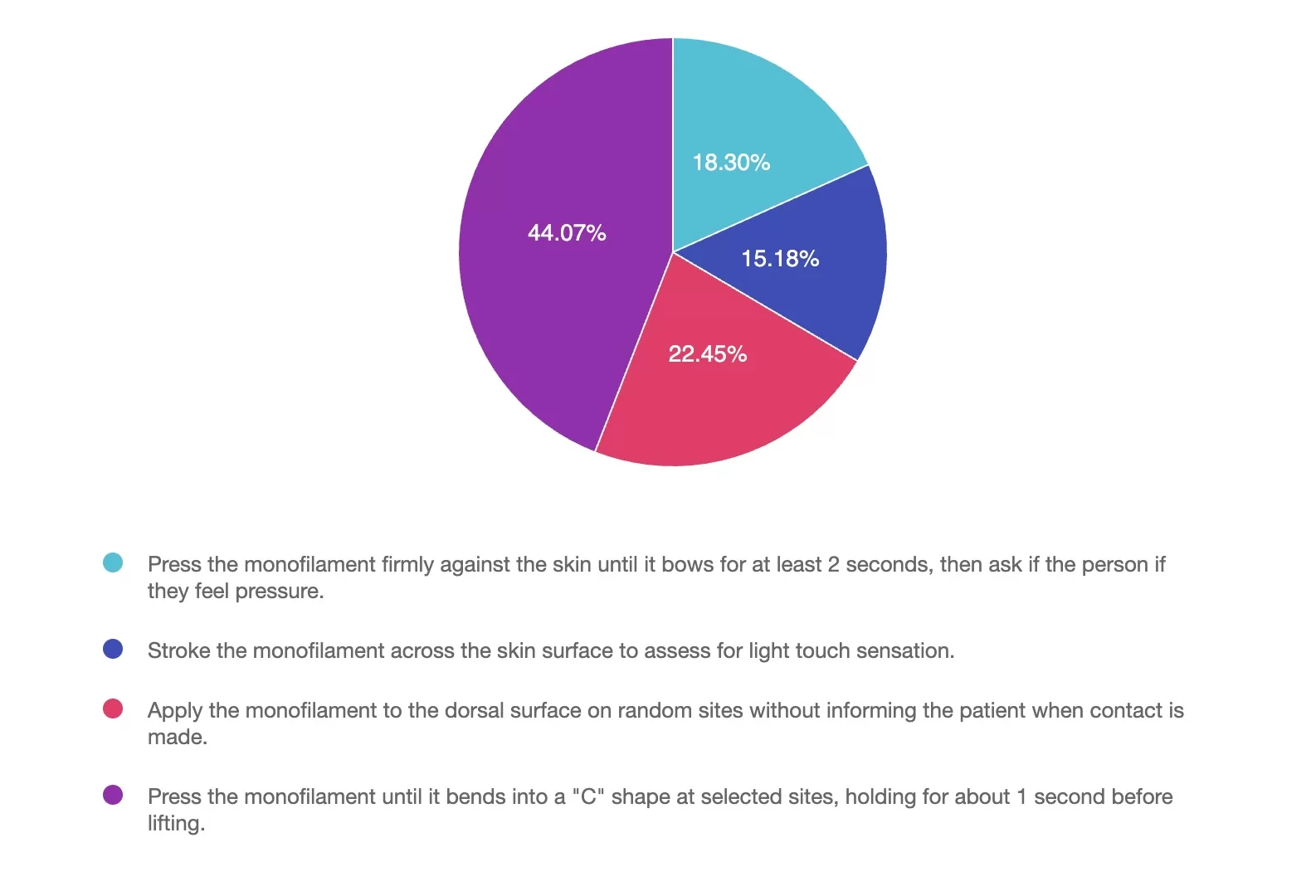
Getting to the Best Answer
Answer 1 is incorrect. 18% chose this answer, “Press the monofilament firmly against the skin until it bows for at least 2 seconds, then ask if the person if they feel pressure.” This answer is tempting. You only need to apply the monofilament for one second and you don’t want to ask the person if they feel pressure when you are bending the monofilament into a C-shape on the plantar surface of four sites (as noted in the image below) . This could lead to them simply saying “yes” when you ask if “they feel it”.
Answer 2 is incorrect. 15% of you chose this answer, “Stroke the monofilament across the skin surface to assess for light touch sensation.” When using the monofilament, you only need to apply the monofilament for one second by bending it into a C-shape on the plantar surface of their feet on the four sites (as noted in the image below) to evaluate for sensation. This evaluation does not include stroking the monofilament.
Answer 3 is incorrect. About 22% of respondents chose this, “Apply the monofilament to the dorsal surface on random sites without informing the individual when contact is made.” You need to apply the monofilament for one second by bending it into a C-shape on the plantar surface of their feet on the four sites (as noted in the image below) to evaluate for sensation.
Finally, Answer 4 is correct. 44% chose this answer, “Press the monofilament until it bends into a “C” shape at selected sites, holding for about 1 second before lifting.” Yes, GREAT JOB. Simply apply the monofilament for one second to the sites on the image below, going above or below calluses. Ask the person to close their eyes and say yes when they feel the pressure as you bend the monofilament into a C-shape on the four plantar surfaces sites (as noted in the image below). If they can’t feel on one or more touch points, this is a sign they have “loss of protective sensation” and are at increased risk of foot injury.
 For more information on Lower Extremities – we have some great resources.
For more information on Lower Extremities – we have some great resources.
Free Assessing Lower Extremity Handout
Free Webinar: 3 Steps to DeFeet Amputations
Register for our Level 2 – Lower Extremity Assessment Course- Earn 1.5 CEs
We hope you appreciate this week’s rationale! Thank you so much for taking the time to answer our Question of the Week and participate in this fun learning activity!
Older Individuals are at Higher Risk of Foot Injury
Enroll in our Older Adults & Diabetes to learn more

We are living longer & more people are getting diabetes. The American Diabetes Association has updated the Older Adults Standards, with special attention to considering the reduction of medication & insulin therapy intensity. The older population has unique issues & special needs that require consideration as we provide diabetes self-management education. This online course highlights key areas of assessment, intervention, and advocacy for older clients living with diabetes.
Question of the Week | Decoding AGP Report – Test Your Knowledge

AJ asks you why their blood glucose levels are “all over the place”. When you look at the AGP, you notice the coefficient of variation is 26%. What is the best response?
- Even though your coefficient of variation is above target, we can work to bring that down.
- It seems like you are making a big effort keep your glucose in target range.
- Given your glucose fluctuations, we may need to intensify your medication regimen.
- With some small changes in lifestyle activities, I am sure you can make improvements.
Want to learn more about this question?
Join us live on May 8th & May 15th
Tech Data Toolkit!

Gain confidence in interpreting Glucose Profile Report (AGP) & CGM data using a person-centered approach! Earn 4.0 CEs
If you are preparing for certification exams or want to up your game using CGM data to improve outcomes, this course is for you.
We still have room available for the May 8th kick off date.
Save 20% – Use code Bloom20 at checkout!
Join us live for this unique learning experience.
Session 1 – May 8th
with Beverly Thomassian at 11:30am to 12:30pm PST
Session 2 – May 15th
with Dr. Diana Isaacs at 11:30am to 2:30pm PST
Gain confidence in interpreting Glucose Profile Report (AGP) & CGM data using a person-centered approach.
As diabetes technology is becoming commonplace in our practice, figuring out how to make sense of all the data can seem overwhelming. Join Diana Issacs and Coach Beverly for a truly unique learning experience.
Dr. Isaacs has a special knack for breaking down the essential elements of the Ambulatory Glucose Profile (AGP) report to provide participants with a clear road map for data interpretation. She includes many sample practice cases utilizing CGM data for various types of people with diabetes including type 2 and people with type 1 not on pumps.
Coach Beverly will build on Dr. Isaacs’ presentation and switch the focus to the person living with diabetes. Using a case study approach, she will provide strategies to integrate the AGP with person-centered care that empowers individuals to experience increased confidence in their diabetes self-management.
By attending this interactive workshop, participants will become more confident in interpreting the AGP and continuous glucose monitor (CGM) data and determining needed medication and lifestyle adjustments with a person-centered approach.
Topics include:
Review CGM key metrics and individualize time in-range goals
Learn how to recognize patterns with the AGP report efficiently
Utilize the AGP report as a discussion guide when meeting with a person with diabetes
Recommend lifestyle and medication adjustments based on CGM data
Strategies to recognize the expertise of the individual and collaborate on person-centered problem solving.
All hours earned count toward your CDCES Accreditation Information
Sign up for Diabetes Blog Bytes – we post weekly Blog Bytes that are informative and FREE! Every week we post one exam practice Question of the Week and Rationale of the Week. Sign up below!
Recent Blog Bytes
- Rationale of the Week | Which Feature Most Strongly Supports a Diagnosis of HHS Rather Than DKA?
- How Not Winning Motivated Me to Write A Book
- Question of the Week | What Not to Say to Overwhelmed Individual
- February 2026 eNews
- Rationale of the Week | Best Response for Facilitating Positive Health Behavior Change?
The use of DES products does not guarantee the successful passage of the certification exam. CBDCE and ADCES do not endorse any preparatory or review materials for the CDCES or BC-ADM exams, except for those published by CBDCE & ADCES.






